In August 2020, Craig Mount and Erika Peterson found themselves in an enviable position.
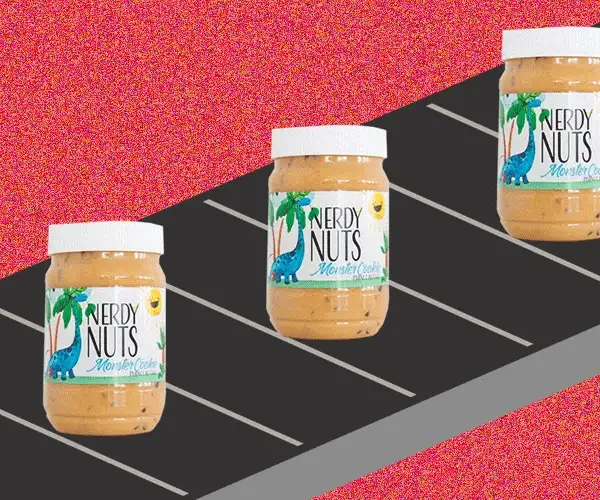
Nerdy Nuts — the D2C peanut butter company they’d founded just 18 months earlier — had gone viral on TikTok. In the span of a few days, the couple had watched their sales multiply by 20x.
But they didn’t have time to celebrate.
They faced a backlog of $500k+ worth of orders, a depletion of inventory, and thousands of emails from cranky customers. What began as a tiny side hustle at a farmers market in South Dakota had ballooned into a monster.
Nerdy Nuts’ journey is every entrepreneur’s dream: Create a cool product. Find a unique way to market it. Hack your way to expedited growth.
It’s a case study in marketing, which touches on:
- The underutilized value of TikTok as an influencer tool
- The psychological power of scarcity
- The “Holy Grail” of a product feedback loop
But it’s also a cautionary tale about the unglamorous underbelly of overnight success.
From idea to farmers market
The couple’s path into peanut butter began around 2015.
At the time, Peterson was a clothing store manager at the Chapel Hills Mall in Colorado Springs, Colorado. Mount would often grab lunch at a nearby eatery that sold jars of flavored peanut butter.
“The shop closed down and I thought, ‘Where do I get this stuff now?’” recalls Mount. “So I just decided to give it a shot on my own.”

Peterson (left) and Mount (right), with their son (Craig Mount)
In the summer of 2017, he logged on to eBay and bought a used Olde Tyme PN1 nut grinder for $870. But shortly after the purchase, the couple moved to Rapid City, South Dakota — and the machine ended up gathering dust in the garage.
In early 2019, Peterson, then pregnant and on the hunt for a new gig, decided to finally put the grinder to use.
That summer, she and Mount launched Nerdy Nuts (~$2.5k upfront investment in total) and began selling their first two flavors, honey roasted and white chocolate, at a local farmers market.
Zachary Crockett / The Hustle
The farmers market was the ideal focus group for a new product.
“We spent hours and hours in front of live customers, whom we were able to see test out products in real time,” says Mount. “It became an excellent testing ground — and a perfect way for us to iterate.”
By the end of the summer, Nerdy Nuts was the most popular booth at the farmers market, routinely bringing in ~$1k every Sunday.
For Mount and Peterson, Nerdy Nuts was only intended to be a low-stress side hustle.
Mount already made six-figures running an SEO consultancy, a job which monopolized most of his time. The couple was also raising a child — and another one was on the way. They weren’t looking to start a D2C peanut butter empire.
But the market had other plans for their product.
The takeoff
Purely out of curiosity, Mount began spending some of his free time studying the niche world of peanut butter.
He went on a voracious reading spree, learning about the history of modern peanut butter. He befriended members of the American Peanut Council, the industry’s largest trade group. He spent late nights Googling things like “how to affix a label without getting oil on it.”
Through his research, Mount learned that nearly 60% of the $1.9B US peanut butter market is controlled by 2 companies: the J.M. Smucker Company (which owns Jif) and Hormel Foods (Skippy).
But he also compiled a list of 127 smaller players, including direct-to-consumer (D2C) brands, and saw a trend: Most were marketed as “healthy” or “keto-friendly.”
He decided early on that Nerdy Nuts would focus more on flavor and fun.
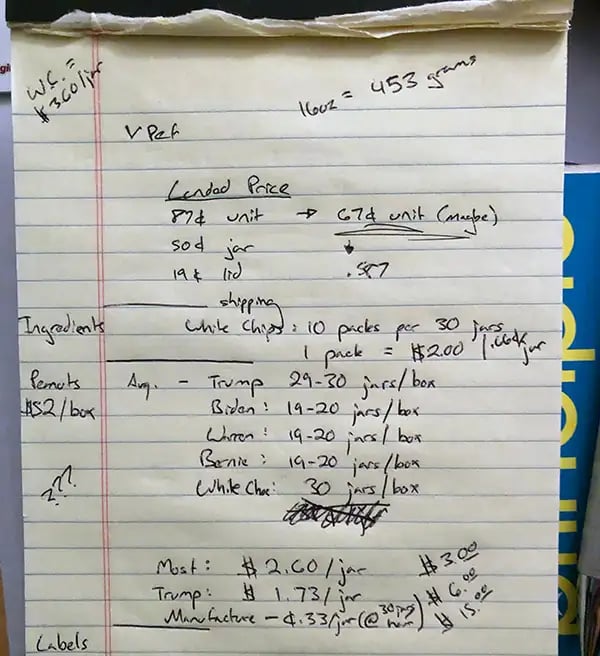
Back-of-the-notepad math Mount jotted down in the early stages (Craig Mount)
Seeking advice on where to take the company, Mount posted in The Hustle’s Trends Facebook group, a community for entrepreneurs.
In the group, he met a PR whiz named Adrian Salamunovic.
Salamunovic was convinced that Nerdy Nuts could be the “Ben & Jerry’s of peanut butter” and advised Mount to double down on quirky marketing.
One idea in particular stood out.
Back in 2008, during the Obama-McCain election cycle, Airbnb had made $30k by selling cereal boxes themed after each candidate. Salamunovic suggested reprising the concept with peanut butter.
In June 2019, Nerdy Nuts released a flavor for each candidate, based on his or her favorite food(s):
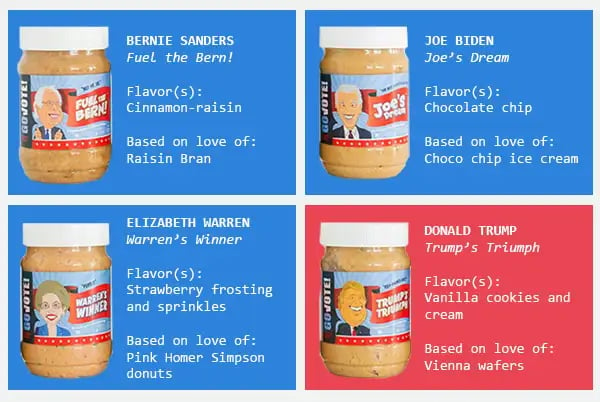
Zachary Crockett / The Hustle
Mount spent 40 hours cold-emailing 200+ reporters and got a bite from Fox Business. After landing a feature on the national talk show The Five, Nerdy Nuts got its first taste of virality.
In the first 48 hours after the segment aired, the tiny company made $20k in sales.
It was the company’s first taste of big success — and the business was woefully under-prepared for the bump.
Their sole machine could only produce 60 jars of product per hour, and they were working out of a “dinky little kitchen” they’d rented from a local catering company.
Joined by a rotating cast of family and friends, Mount and Peterson worked around the clock to tackle the influx of orders. Their garage became a temporary fulfillment center.
“It was an overnight success story, but it was also super stressful,” says Mount. “You’re just thrown into this storm and you have no time to think.”
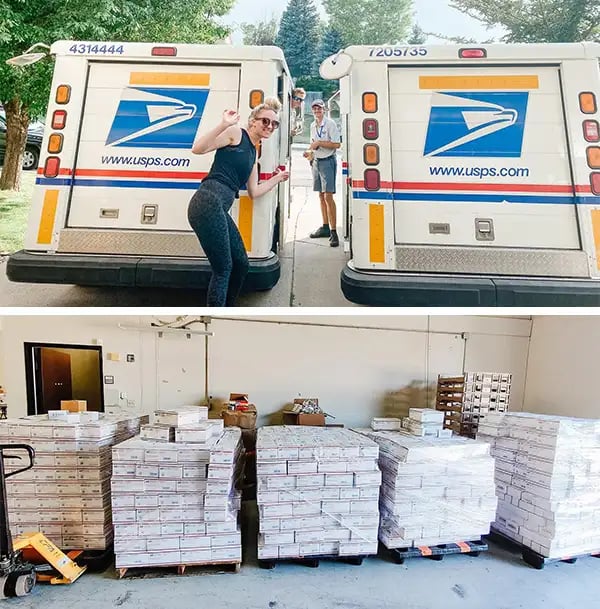
Peterson receives a huge order of supplies (Craig Mount)
The influx forced them to iterate their product:
- They switched from grinding nuts for each individual jar to grinding “batches” and filling multiple jars at once.
- They migrated their website from WooCommerce/Wordpress to Shopify — a decision that improved the checkout process and boosted order volume.
- They went all-in on D2C sales, as opposed to farmers’ markets or traditional retail.
Running Nerdy Nuts as a direct-to-consumer business, the couple learned, came with microeconomic benefits.
Traditional food brands that vie to get on retail shelves tend to follow a rule of one thirds when thinking about costs and profit:
- ⅓ = manufacturing costs (e.g., ingredients, production, labor)
- ⅓ = distribution costs (e.g., grocery store slotting and listing fees)
- ⅓ = retail profit
But going the D2C route, Nerdy Nuts could avoid paying for distribution and reduce the retail price of its products.
As a result, the company’s unit economics were better: A jar of Nerdy Nuts retailed for $11.99 and cost ~$5 to make, a gross margin of ~60% before other expenses.
Higher order volume soon allowed them to buy in bulk and shave down costs even more.
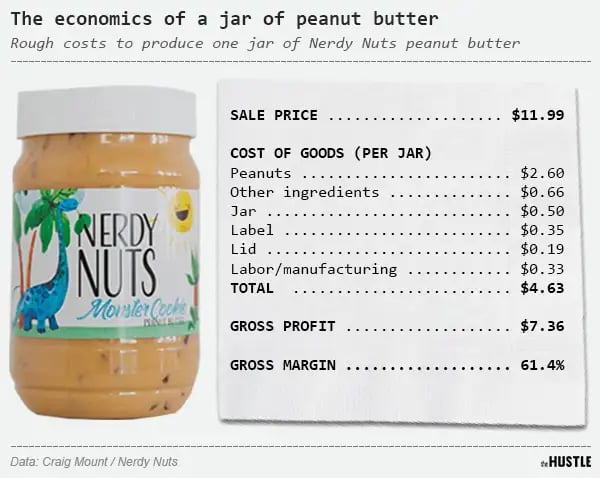
Zachary Crockett / The Hustle
By the end of 2019, the couple had netted ~$60k in sales.
As the business gained steam, Mount and Peterson grew a little apprehensive about the pace of acceleration. What was only intended to be a hobby was ballooning into a full-time job.
Mount decided to just keep things fun and focus on storytelling.
On the Nerdy Nuts site, Mount and Peterson focused on whimsy, listing a make-believe product called Unicorn Dust for $777.77. They went into a “heavy development period,” inventing and testing new flavors, like butterscotch, marshmallow, and toffee.
Throughout most of early 2020, Nerdy Nuts hummed along at ~$8k/month in steady sales, buoyed, in part, by a wave of pandemic-related peanut butter panic-buying.
But they never could’ve anticipated what the next few months had in store.
The TikTok explosion
In June 2020, Mount decided to test out peanut butter “product drops.”
“Supreme clothing, or [Adidas] Yeezy sneakers, have these limited edition drops all the time,” says Mount. “I thought, ‘Why not do the same thing for peanut butter flavors?’”
Nerdy Nuts dropped 3 new flavors — Monster Cookie, Oreo Cookie, and Circus Cookie — and turned to Instagram to market them.
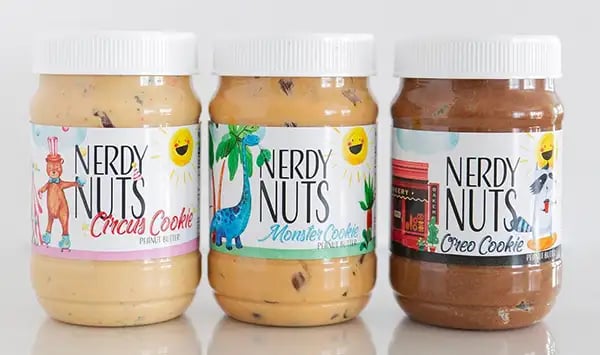
Nerdy Nuts product drops (Craig Mount)
Mount got 18 influencers to peddle the peanut butter, but soon found them to be difficult to work with.
“Once an Instagram influencer hits 10k followers, they think they’re some kid of celebrity,” he says. “They have price sheets and agents. They demand monthly retainers. They send you these BS proposals, promising x number of impressions.”
The drops were popular and boosted Nerdy Nuts’ sales to $27k for the month of June. But only a fraction of those sales (107 jars) came from the Instagram influencers.
Peterson had a suggestion: Why not try TikTok influencers instead?
The couple reached out to two TikTokers: Ali Grace Morsell and Hailey Peters, both of whom had ~500k followers at the time.
“It was a totally different response,” says Mount. “They were like, ‘OMG, you want to send me free peanut butter?!’ They were just so flabbergasted that anyone would want to send them something for free.”
Astonishingly, videos posted by the TikTokers generated millions of views, resulting in 5,947 sales, and setting off a snowball effect.
Nerdy Nuts sales ballooned to $165.2k for the month of July.
Mount shared a 10% cut with the influencers — an amount that surpassed Morsell’s husband’s military check.
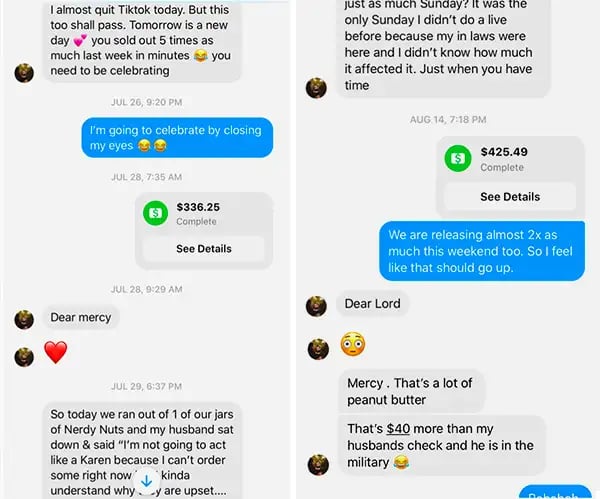
Texts exchanged between Mount and Morsell (Craig Mount)
Mount acknowledges that TikTok isn’t some magic bullet. Other food products — a candy company and a BBQ joint — tried their luck with the same influencers and didn’t see the same results.
But he’s still bullish on the possibilities of the platform.
“I can’t stress this enough: People are sleeping on TikTok,” says Mount. “People think it’s just a place where kids do stupid dances, but it’s really not. These influencers made the Fox News sales look like a joke.”
The scarcity ‘feedback loop’
This explosion in sales upended Nerdy Nuts’ entire operation. Already facing a backlog, Mount and Peterson scrambled to expand:
- They bought 17 more PN1 peanut grinders.
- They hired a part-time staff of 25 people.
- They took over the lease at the kitchen they were sharing.
- They paid someone from O’Dang Hummus $9k to “deconstruct” their product line and optimize production to 4k jars per day.
The stress that came with this hockey stick growth was overwhelming.
“We had a very sweet setup before — a balanced lifestyle,” says Mount. “Then, suddenly, it’s just thousands of angry emails, and trying to keep everyone happy.”

One thing that Mount and Peterson did to relieve dress: spend $8k on a full-body mascot, produced by the same company that makes them for NFL teams.
This led Nerdy Nuts to make its next crucial decision: It closed its site and only opened up sales one day per week.
“From a logistics standpoint, selling out was the worst thing that could’ve happened,” says Mount. “But from a marketing standpoint, it was the best thing ever.”
Mount found that selling out created a lucrative “feedback loop”:
- It created an illusion of scarcity for those who didn’t get a jar.
- It made people who did get a jar feel exceptionally special.
When Nerdy Nuts opened the site on that first Sunday, they made $80k in sales and had to shut it down again after just 2 minutes.
Demand swamped supply, and customers began to grow irate.
“People were calling me begging for peanut butter,” says Mount. “They’d say, ‘My family member just died and I NEED this,’ or ‘All I wanted in life was to share a jar with my newborn niece!’”
Thousands of emails and Facebook comments poured in — some demanding that Mount and Peterson “get back in the kitchen and make more peanut butter.”
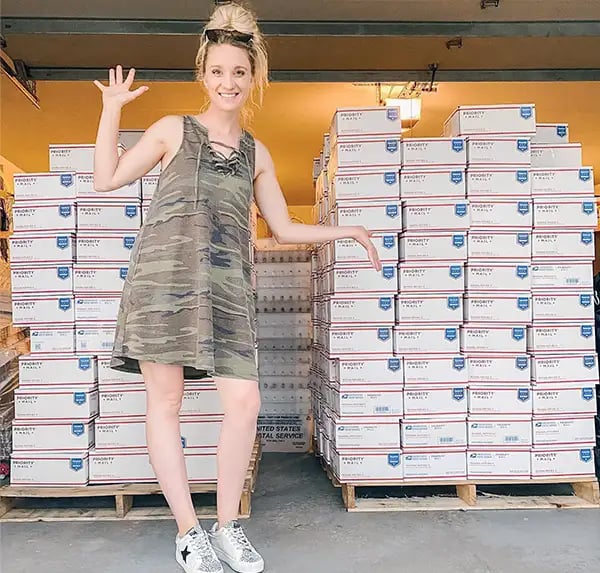
Peterson with yet another huge order of supplies (Craig Mount)
On eBay, an aftermarket sprouted up, with jars going for $40 a pop. Customers sent Mount photos of themselves sitting on their laptops every Sunday, waiting for the shop to open.
“People have told me that getting a jar of Nerdy Nuts is like getting tickets to a Taylor Swift concert,” says Mount.
The hype came with dividends: In August, Nerdy Nuts topped $505,862 in sales — a 20x increase from just a few months prior.
Growing pains
Ascending to $500k in sales in a matter of months may sound like a dream scenario. But Mount says the growth has put the company in a precarious position.
To fully capitalize on his newfound success, Mount has had to form instantaneous partnerships with outside manufacturers and co-packers.
“Insane growth puts you into bad relationships and shotgun weddings,” says Mount. “You have to trust people you have no time to properly evaluate.”
They’ve also faced several pandemic-specific challenges:
- The nation’s largest peanut butter company, Jif, cleaned out the entire 16 oz. peanut butter jar supply, causing a shortage.
- Many peanut producers are struggling to meet increased demand.
For the past few months, Mount has intentionally throttled his sales so he can catch up on backlogged orders.
But the hype isn’t dying down: In September, Nerdy Nuts’ sales were $266k. October is on track to surpass that: One release alone — a “Cookies and Scream” flavor — netted the company $115k in one day, pushing its 2020 sales total over $1m.
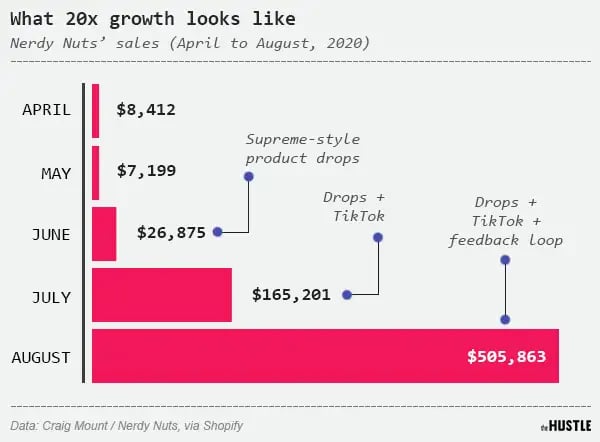
Zachary Crockett / The Hustle
Mount acknowledges that Nerdy Nuts’ “problems” are a bit of a “tiny violin” — especially in the larger context of a pandemic that has left millions of Americans unemployed.
But he’s been wondering lately if the rapid virality of the business is more trouble than it’s worth. “We would’ve preferred to just grow slow and steady,” he says.
Now 33, Mount is preoccupied with a different type of growth — that of his 2 young children.
“I’d be happy to see this sell someday,” he says. “But if it all crashes and burns tomorrow, I’ll just go back to doing technical SEO.”
Correction: An earlier version of this article stated that Nerdy Nuts is based in Grand Rapids. The company is actually located in Rapid City. The error has been amended.
Shameless plug: Craig and Erika built Nerdy Nuts with the aid of Trends — a community of entrepreneurs who help each other launch awesome companies. Give it a spin for just $1 here.
